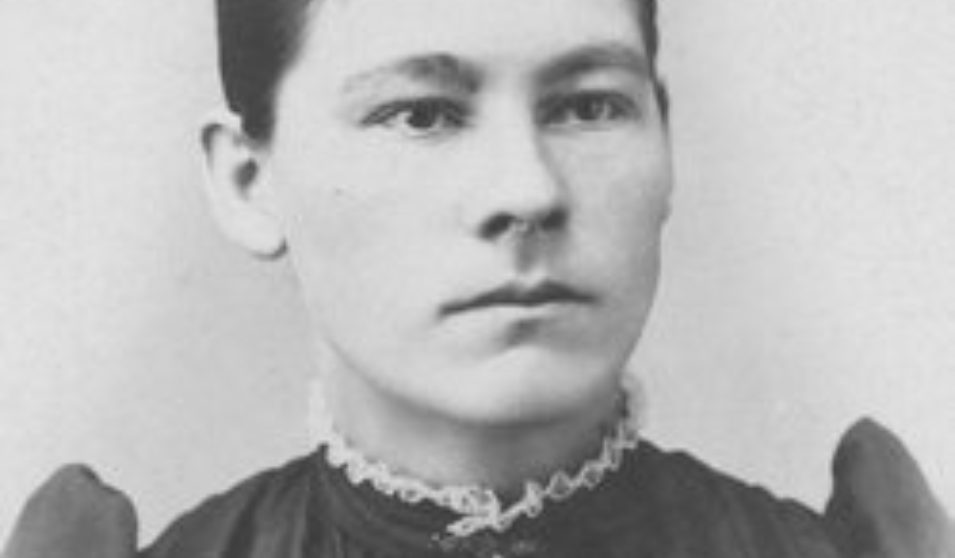"The windows were five in number, of twelve panes each. They were situated so low in the walls as to give full opportunity to the pupils to see every traveler as he passed; and to be easily seen. "
A teacher, whose name is long forgotten, describes an 1810 New England school. [i]
Jane Collins was born in Nemaha County, Nebraska in 1869. Her father was a jack of all trades—a farmer, dairyman, and dentist. Jane’s mother, Minerva, managed a household that included five brothers and sisters. In 1874, Jane’s family moved to a farm near the town of Simpson in Cloud County, Kansas. This is where Jane and her siblings grew up. This is where she attended her first school classes in a dugout schoolroom.
Like scores of other young women across the prairie, Jane developed a strong desire to become a teacher. Unlike some young ladies, though, Jane had a father who championed education and the rights of women. This encouragement and her personal ambition would lead to a remarkable career, one that included a superintendency and extraordinary community leadership and service.
Jane Collins began teaching when she was sixteen years old after she had passed the required examination and was issued a county certificate by the Superintendent of Schools of Cloud County. Her first contract was for a four month term in 1885. She earned $30 a month and boarded with a school neighbor, where she cooked meals, dressed the children, and helped milk the cows.
Ms. Collins went on to teach for three more decades, and she encountered some of the same challenges teachers often face today. One year she had 50 pupils in her classroom; another year the desks were rough and homemade and would not adjust to the children. There were playgrounds with no equipment, and there were board members whose actions and comments were perplexing at best. After her retirement Collins recalled with humor a conversation she had with a board member during an interview for a teaching position. When she questioned the board member about the quality of the school’s equipment, the board member thought carefully for a few minutes and then “assured her that the district had a ‘right good stove.’”[ii]
After thirty years of teaching “Miss Jane” was elected Superintendent of Schools for Cloud County, a position she would hold for twenty years. Collins was a dedicated superintendent, and she was appreciated for her regular school visits, personal encouragement to students and teachers, and her penchant for providing clothes and food to families with children in need. In February of 1919 a county newspaper provided its readers with the following account:
“The W.P. Duvall family residing 12 miles from Concordia knows that there is at least one Good Samaritan in Concordia. That Samaritan is Miss Jane Collins, County Superintendent; and her merit to the title is this: When the roads were so icy Wednesday that liverymen refused to make the trip, and members of the family were too ill to come town for medicine, Miss Collins walked the twelve miles to deliver the medicine. She not only walked out, but walked part of the way back.”[iii]
In 1929 an Illness forced Miss Collins to resign as County Superintendent, but she soon returned to the school house as a classroom teacher. Then, three years later, she was again elected to the office of County Superintendent. She remained in that position until 1940, when she retired at the age of 71. The retirement was short-lived, though, and Miss Collins returned to the classroom in 1942 due to a severe teacher shortage brought on by World War II. She continued teaching until 1946, and, finally, at the age of 77, she retired for good.
What inspired such sacrifice and commitment? Why would a 73 year old woman give up her gardening, reading, crossword puzzles, radio listening, and violin playing to return to the daily grind of teaching young children? Perhaps it was the devotion of former students. Perhaps it was the admiration of her peers. Perhaps it was a family upbringing where women’s rights and public education were championed. Perhaps, just perhaps, it was nearly six decades of educational experiences that were grounded in community, a grounding where responsibility and personal satisfaction went hand in hand.
In 1954 Concordia, Kansas’ local Delta Kappa Gamma chapter, a teachers’ service sorority, prepared an article for submission to the Delta Kappa Gamma national publication, which was dedicating an issue to pioneer teachers of the United States. The tribute included these words:
“Miss Collins was a remarkable person. As an educator she was efficient, resourceful, and progressive, and as a neighbor she proved to be consistently helpful and understanding, a true friend to many who knew her. Her concern for the children she taught extended beyond the school room to include their life circumstances and those of their families as well. It was truthfully said of her: ‘She went about doing good.’”[iv]
Honoring Miss Collins
The legacy of teacher-leaders like Jane Collins is an important element of American history that has too often been discarded or shoved aside. American society is infatuated with wealth, fame, and martial glory, and we have a sorry penchant for ignoring the people who build and maintain community. Public service has many faces, and it is through these collective works that we define who we are and build a binding narrative. In many ways we have lost our national "story," and I believe this lack of connection and ownership has provided an opening for actions and policies that are harmful, disingenuous, and exploitative.
To honor Miss Collins is to reaffirm the importance of school and community. It is recognizing that we must rebalance a playing field that tilts too sharply toward the private sector. It acknowledges that we must work diligently to bridge the urban-rural divide. As Wendell Berry wrote, "The only sustainable city—and this, to me, is the indispensable ideal and goal—is a city in balance with its countryside."
So, we are going to fight like the dickens for public education. Working alongside our schools, teachers, and children we can restore rural communities that are inclusive, ecologically sustainable, and brimming over with enthusiastic and committed teacher-leaders. This is how it should be; this is how it will have to be.
A necessary rebalancing requires that with a Joshua-like fervor rural communities must bring down the walls that often separate school from community. The teaching of children should be transparent, a school without walls, without boundaries, where the pupils see and are easily seen. Yes, a room with many windows. Surely it is time to take what we have gained in technological capabilities and try to recapture the community values we have lost. Reestablishing a rural school model where students, teachers, and parents work together to do "good" in a place that has shared meaning—truly an American opportunity.
[i] Johansen, John H., Collins, Harold W., and Johnson, James A. American Education: An Introduction to Teaching. 1990, Dubuque, Iowa, William C. Brown Publishing Company, p. 237.
[ii] During my second year as a fifth grade teacher in rural Bolivar, Missouri a school board member said on the record that he wanted “his teachers to be like the buses—clean and shiny.”This was in 1981.
[iii] Freeman, Rosemary. “Jane Collins: Pioneer Teacher of Cloud County, Kansas, paper prepared for the local Delta Kappa Gamma committee and submitted to the Kansas One Room Schoolhouse Project, Southwestern College, Winfield, Kansas, 1997.
[iv] Ibid





